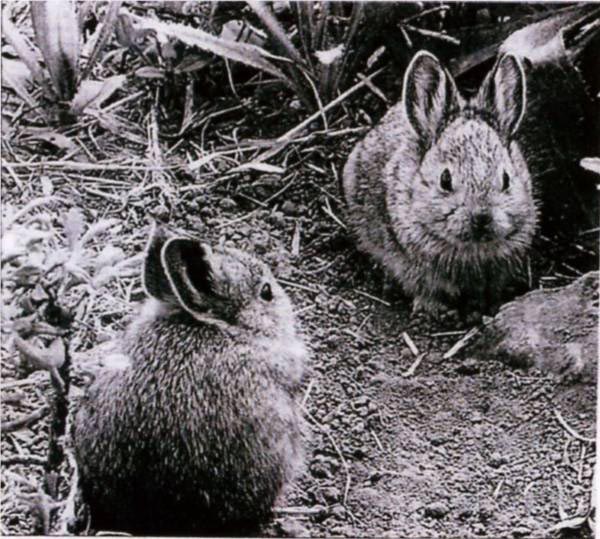Stress takes a toll on animals too, scientists find
The effects of competition on critters may be relevant for humans, researchers say
- December 2, 2004 Tom Spears - Vancouver Sun
Birds, bunnies and the rest of the animal world suffer post- traumatic stress, just like humans. And it can last for years or even generations -- a result of scarce food and especially, predators. Only years of therapy can cure this stress, University of Toronto biologist Rudy Boonstra believes -- therapy that comes from easier living conditions.
A new Canadian-led study of sparrows builds on an earlier study of snowshoe hares, revealing a pattern of stress that likely crosses many species, including humans. When birds and hares go through stressed-out times, they can't reproduce in large numbers, and they carry high levels of stress hormones along with low levels of energy- boosting compounds.
"Kill-or-be-killed combat stress can have life-long consequences for humans," Boonstra said. "Wild animals experience something similar daily having to find food while avoiding being killed by predators. The same type of things that affect you and me -- we compete for jobs, compete for mates, compete for resources -- affect the natural world. "Our bodies, I mean all animals, are exquisitely adapted to deal with it. But there are costs."
This came to light in a 1990s study of the northern snowshoe hare, a common animal throughout the boreal forest, and the main diet of foxes, coyotes, lynx and many hawks.
For hundreds of years, fur traders have tracked a 10-year cycle of rising and falling hare numbers. When hare are plentiful, fox and coyote numbers rise. These extra predators kill off most of the hares, until hares are scarce and predators' numbers drop. Then hares multiply again. But it's not that simple, Boonstra discovered. Hares aren't the same animals in good times as they are in bad times.
"The question is, do they know it?" said Boonstra. "Do they know that after the peak (in hare numbers) the tide is turned against them? Are they conscious of the world? And the answer is 'yes.' "Everything I've done on their physiology shows very clearly that they're stressed all to heck."
After the hare population plummets, it takes time for hares to breed again. The animals retain physical signs of stress, such as increased stress hormone levels. And even in a safe lab they won't breed well, often for several years, until the memory of constant attacks by predators has faded. They're just like war veterans, Boonstra believes.
"The hypothesis is that the memory is encoded both in the individual . . . and I believe that it also affects the progeny. We've not shown this, but I believe the progeny also carry memory of the experiences of their parents" through chemical effects on hare fetuses in the womb.
In the new study, Boonstra and colleagues at the University of British Columbia, University of Western Ontario and Washington University studied song sparrows on some Gulf of Juan de Fuca islands. These mimicked the hares' experience. Sparrows surrounded by predators and with little food reproduced very poorly. They had high stress hormone levels. They lacked the energy to fly well.
 Sparrows with only moderate
problems reproduced a little better than the high-stress birds. And those with
stress-free surroundings reproduced at four times the rate of their stressed-out
cousins.
"Are we subject to these
organizational changes in our brain as are these short-lived species? We don't
know . . . but the template is similar," said Boonstra.
Sparrows with only moderate
problems reproduced a little better than the high-stress birds. And those with
stress-free surroundings reproduced at four times the rate of their stressed-out
cousins.
"Are we subject to these
organizational changes in our brain as are these short-lived species? We don't
know . . . but the template is similar," said Boonstra.
The report is printed in the Proceedings of the Royal Society.
The fear of predators has been found to produce lasting effects on the physiology of an animal.
Comment: It is common knowledge that animals experience emotions and feelings, the same as humans do. Whether itís sadness, fear, happiness, or stress, studies have proven this over and over.
December 27, 2012 Why Care about Animals When There Is So Much Human Suffering?
To paraphrase Australian philanthropist Philip Wollen, If there was anything in nature as violent and destructive as man, we would call it a virus and attempt to wipe it off the face of the earth.
Visit our Poems, Quotes, & More Page
Farm animals 'need emotional TLC'; animal consciousness; cognitive dissonance; our immorality
Compassion, respect, and justice for those with no voice. Animal rights is a social justice movement. Join us in taking action for the oppressed - the silent victims.